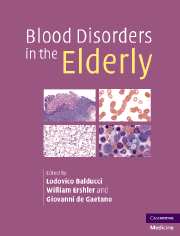Book contents
- Frontmatter
- Contents
- List of contributors
- Preface
- Part I Epidemiology
- Part II Hematopoiesis
- Part III Anemia of aging
- Part IV Hematologic malignancies and aging
- 18 Cancer chemotherapy in the older person
- 19 Acute myeloid leukemia in the elderly
- 20 Acute lymphoblastic leukemia in the elderly patient: diagnosis and therapy
- 21 Multiple myeloma
- 22 Non-Hodgkin lymphoma
- 23 Unusual lymphomas in the elderly
- 24 Chronic lymphocytic leukemia in the elderly
- 25 Polycythemia vera and idiopathic myelofibrosis in the elderly
- Part V Disorders of hemostasis in the elderly
- Index
24 - Chronic lymphocytic leukemia in the elderly
from Part IV - Hematologic malignancies and aging
Published online by Cambridge University Press: 21 October 2009
- Frontmatter
- Contents
- List of contributors
- Preface
- Part I Epidemiology
- Part II Hematopoiesis
- Part III Anemia of aging
- Part IV Hematologic malignancies and aging
- 18 Cancer chemotherapy in the older person
- 19 Acute myeloid leukemia in the elderly
- 20 Acute lymphoblastic leukemia in the elderly patient: diagnosis and therapy
- 21 Multiple myeloma
- 22 Non-Hodgkin lymphoma
- 23 Unusual lymphomas in the elderly
- 24 Chronic lymphocytic leukemia in the elderly
- 25 Polycythemia vera and idiopathic myelofibrosis in the elderly
- Part V Disorders of hemostasis in the elderly
- Index
Summary
Introduction
Definitions
Chronic lymphocytic leukemia (CLL) is a hematologic neoplasm of unknown etiology with a clinical course that is measured in years rather than in the weeks that used to characterize the clinical course of the acute leukemias. This distinction was made in the era before any effective therapy was available for the acute leukemias and rapid death was the usual outcome. As a result, the chronic leukemias were considered to be “favorable” diseases because of their longer prognosis. In young patients, advances in the treatment of the acute leukemias have been dramatic, frequently resulting in cure, and as a result the chronic leukemias are no longer considered so “favorable.” In older patients, progress in treating the acute leukemias has been much more modest, and as a rule the prognosis of the chronic leukemias, particularly that of CLL, remains relatively favorable. The broad categories of the chronic leukemias that are encountered in the older person are listed in Table 24.1.
The older person is not so readily defined, because the concept of age is to many people, including physicians, highly subjective. A wry definition of “elderly” is “anyone significantly older than the observer,” and psychologically there is much truth in this.
- Type
- Chapter
- Information
- Blood Disorders in the Elderly , pp. 342 - 369Publisher: Cambridge University PressPrint publication year: 2007



